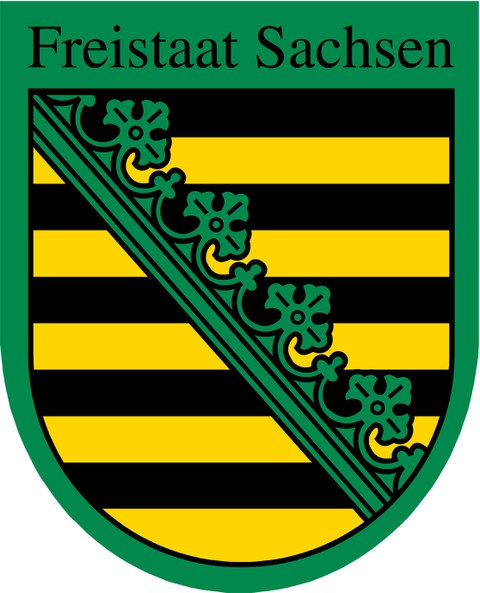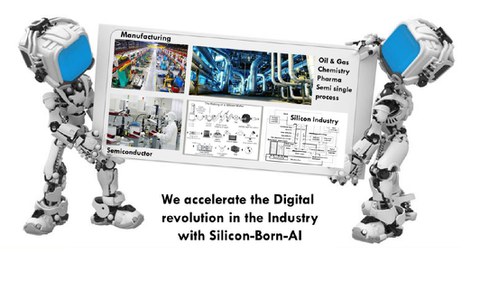AI4DI
Today's robots are largely unable to carry out target-oriented human-machine interactions. There are initial approaches to enable robots to collaborate with humans using additional sensors. However, this goes hand in hand with a significant increase in costs as well as significant limitations in the technical performance of the robots.
In order to enable robots of all sizes and performance classes to "feel" - as a basic prerequisite for target-oriented human-machine interaction -, a novel sensor system based on electrical time-domain reflectometry (ECBR) is to be developed by the TU Dresden as part of the subproject "Sensitive structures for human-machine interaction in digitized process chains" of the EU project AI4DI. The use of the EZBR principle enables the production of sensors that can combine both force- and spatially resolved measurements. In addition, ECBR sensors are comparatively simple and cost-effective to manufacture and scalable in size, which is why such sensors are particularly suitable for industrial mass use. However, the technical maturity of such sensors has so far been low - depending on the source, TRL 3-4 is assumed, i.e. laboratory tests have shown that simple sensory functions can be realized. However, neither an advantageous sensor design for structural components was identified nor a suitable cross-industry methodology was developed to interpret the signals.
The aim of TU Dresden is therefore to further develop the ECBR sensor technology so that it can be transferred into industrial development. The prerequisite for this is the scientific investigation of the multiphysical issues in sensor design, signal preparation and processing as well as the scientific investigation of the issue of the targeted evaluation of the sensors.
ZIH is dedicated to the evaluation, interpretation and classification of sensor signals using machine learning.
The overall aim of the AI4DI project is to develop a technology platform that increases productivity in factories through digitization and automation processes. Within the digitized industry, factories, individual processes and IoT components are interconnected. With the help of machine learning and artificial intelligence, changes and anomalies can be detected. The project initially concentrates on different decentralized applications in five value chains: the production of automobiles, semiconductors, machines, food and beverage production, and the transportation industry. New AI-capable hardware components and AI methods will be developed. Their functionality will be demonstrated using several demonstrators.
Project website
https://ai4di.automotive.oth-aw.de/
Partners
- subproject partner: Technische Universität Dresden, Institute of Lightweight Engineering and Polymer Technology (ILK)
-
Europaen partners
- Belgium: Interuniversitair Micro-Electronica Centrum, Intrasoft International SA
- Finnland: Murata Electronics OY, Teknologian tutkimuskeskus VTT OY, Linkker OY, Vaisto Solutions Ltd.
- France: Commissariat A L Energie Atomique Et Aux Energies Alternatives, Institut Polytechnique de Grenoble, STMicroelectronics Grenoble 2 SAS, Technext, Universite de Reims Champagne-Ardenne, Vranken-Pommery Monopole
- Greece: Information Technology For Market Leadership
- Italy: Consorzio Nazionale Interuniversitario Per La Nanoelettronica, DPControl srl, SCM Group SPA, STMicroelectronics SRL
- Lithuania: UAB Teraglobus, Vilniaus Gedimino Technikos Universitetas
- Latvia: Elektronikas Un Datorzinatnu Instituts
- Norway: Denofa AS, iGlobalTracking AS, Nxtech AS, SINTEF AS
- Austria: AVL LIST GMBH, Infineon Technologies Austria AG, Kompetenzzentrum - Das Virtuelle Fahrzeug, Forschungsgesellschaft mbH, Technische Universität Graz, TTTECH Computertechnik AG, Know-Center GmbH Research Center For Data-Driven Business & Big Data Analytics
- Czech Republic: Institut Mikroelektronickych Aplikaci S.R.O., Vysoke Uceni Technicke V Brne
-
Non-Europaen partner
- Taiwan: Industrial Technology Research Institute Incorporated
ZIH contact
Duration
06/2019–09/2022
Funding
AI4DI has received funding within the Electronic Components and Systems for European Leadership Joint Undertaking (ECSEL JU) in collaboration with the European Union's H2020 Framework Programme, the Bundesministerium für Bildung und Forschung and the Freistaat Sachsen, under grant agreement n° 826060.

Gefördert vom Freistaat Sachsen




